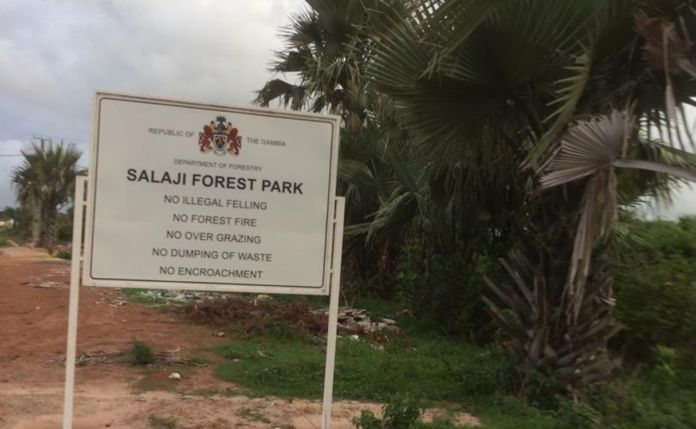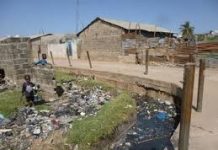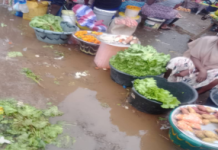A number of associations concerned about the environment have written an open letter to President Barrow urging him to reverse the decision of the Ministry of the Environment to de-reserve part of the Salagi Forest Park. The portion requested is already being levelled. This provoked an outcry by these associations who wrote the following petition to the President.
A delegation from these associations met the Minister at his office yesterday. Foroyaa will report on the meeting in the next edition during which he emphasised that there was no sale and final decision was yet to be taken.
26th August, 2019
H.E Adama Barrow
President of the Republic of the Gambia
State House
Banjul
Your Excellency, we the undersign write to appeal for your personal intervention to reverse the decision to de-reserve a portion of Salagi Forest Park, located in the Kombo North District of the West Coast Region. We came to you as a Community-Based Forest Protection Task Force composed of Civil Society members on environmental protection and development, concerned community members (elders, youth and women) under the purview of ‘All Gambia’ Forestry Platform. We are seriously heartbroken with the recent decision made by the Ministry of the Environment, Climate Change and Natural Resources, to de-reserve a portion of the Salagi Forest Park for non-environmental uses.
We have seen the recent serious impacts of climate change on the livelihood of the citizenry and serious among this is the erratic rainfall pattern, long dry spells and low agricultural yields as a result of land degradation and deforestation. It is evidently clear that this massive deforestation of the country’s forest cover that is going on in the country is promoted by the very public institutions mandated to take full responsibly of managing our environment for the benefit of present and future generations of this country.
Mr. President, the contribution of forest to food security and nutrition varies from in the form of the following:
• Direct provision of food;
• Income generation, which increases access to food;
• Provision of fuel wood for cooking and water sterilization to increase food utilization, and
• Forest ecosystem services which ensures sustainable food production.
The Forest Park in question has provided immense ecological services to humanity in the form of seed and stump collection for propagation and planting in community forests nationwide, provision of fuel wood, fruits and nuts for food and nutrition security and income generation and for grazing to livestock of neighboring communities. All these activities and countless more, has improved the livelihood of these communities.
The Gambia is a party to the three major international conventions directly relevant to the rational and sustainable management and utilization of forest resources and they are:
a) The Convention on Biological Diversity (CBD);
b) The United Nations Framework Convention on Climate Change (UNFCCC), and
c) United Nations Convention to Combat Desertification (UNCCD).
In addition to these three conventions, the Gambia is a signatory against the International Trade in Endangered Species of Wild Fauna and Flora (CITES) and to the Convention on the International Importance of Wetlands (RAMSAR). The key principles and strategies of these conventions were domesticated into the various natural resource legislations which our public institutions are committed to promote on behalf of the Gambia at the international level.
The administration at environment related public institutions particularly the MOECCNAR, is not to the interest of the citizens of this country and the Gambia as a nation. Examples of these are the de-reservation of forest areas (state and community forests) for non-environmental purposes; the illegal exploitation and marketing of our scarce forest resources particularly timber and wood resources; the re-export trade in timber and wood resources with the Gambia named for all the wrong reasons at international level because of its involvement in the illegal trade.
Our public institutions should focus on our forest reserves and resources to prevent any negative impacts that may emanate from its exploitation. Some African countries generate hundreds of millions of dollars from their forests each year, without cutting down trees, changing land use or damaging the environment. This is because they have been mindful of all the impacts that may result from the negative exploitation of their forests. That is why today they are able to generate such huge revenue amounts through tourism and other sustainable activities. Ours is a very sad situation because according to the last national forest assessment and inventory, the country lost closed to 100,000 hectares of forest cover to other land uses within a period of 10 years. And if the trend continues, we will not have a forest in this country in the next 30 years to come. The results of this will be seriously devastating on the livelihood and economy of our beloved country.
De-reserving a portion of Salagi Forest Park and previous de-reservations of other forest areas discourages the concept of Forestry for community empowerment towards forest management and the attainment of its policy objectives in general. In addition, it will impede the attainment of the objectives of our National Development blueprint of the current Government, the NDP.
Based on the above reasons, we solemnly appeal for your personal intervention on the decision of de-reserving a portion of the Salagi Forest Park and for you to commit your Government not to de-reserve any other Gazetted Forest area for non-environmental uses, and to endeavor to protect our priceless natural heritage.
We thank you for your time and look forward to your kind consideration.
Yours faithfully,
Mr. Seeku Janko – All Gambia Forestry Platform
Mr. Salif Puuye – Traditional Healers Assembly
Mr. Lamin Jatta – National Livestock Owners Association
Mr. Musa Gibba – National Beekeepers Association
Mrs Gibbeh Bah – National Appiculture Platform
Mr. Badara N. Bajo – Gunjur Environmental Protection and Development Group
Mr. Alhagie Mboge – National Farmers Platform of the Gambia
Mrs Mariatou Mass – National Association of Food Processors
Mr. Ahmed Manjang – Environment Activist
Mrs Fatou Touray – Women in Beekeeping
Mrs Fatou Solly – Kombo/Foni Forestry Association
Mr. Omar Darboe – Bamboo Foundation of the Gambia





















